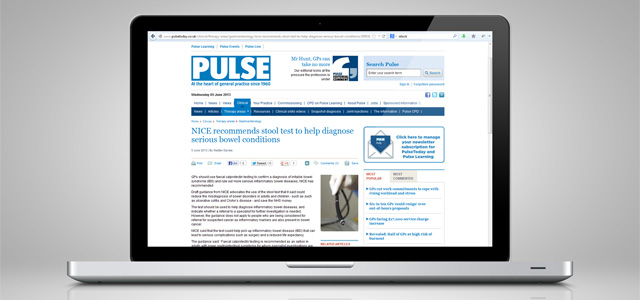Two new reports out this month detail new guidelines for the diagnosis and management of IBS and IBD in Primary Care.
Traditionally, making a diagnosis of IBS or IBD has been difficult and frustrating both for patients and clinicians due to the similarities in clinical symptoms. Correct diagnosis is important however as management and treatment for IBS and IBD are different. Where IBS is diagnosed, patients will receive lifestyle and dietary advice with appropriate medication to treat symptoms, whilst those patients with a suspicion of IBD will be referred to gastroenterology for specialist assessment, along with further tests and interventions including endoscopy.
Faecal calprotectin is a simple diagnostic test which can aid clinicians to more accurately identify those patients who have IBS and those who have a high probability of IBD who will require urgent referral for specialist assessment. Through the emergence of rapid point-of-care tests, access and usability of calprotectin testing is becoming more widely available and easier to integrate into clinical practice within primary care. Clearly, a simple, reliable, reproducible, and non-invasive test, with the ability to differentiate IBD from other gastrointestinal conditions, such as IBS, would be of substantial benefit.
NICE Calprotectin Draft Guidlines
NICE has recommended that GPs should use faecal calprotectin testing to confirm a diagnosis of irritable bowel syndrome (IBS) and rule out more serious inflammatory bowel diseases.
Draft guidance from NICE advocates the use of the stool test that it said could reduce the misdiagnosis of bowel disorders in adults and children – such as ulcerative colitis and Crohn’s disease – and save the NHS money.
The test should be used to help diagnose inflammatory bowel diseases, and indicate whether a referral to a specialist for further investigation is needed. However, the guidance does not apply to people who are being considered for referral for suspected bowel cancer.
NICE said that the test could help pick up inflammatory bowel disease (IBD) that can lead to serious complications such as surgery and a reduced life expectancy.
The guidance said:
‘Faecal calprotectin testing is recommended as an option in adults with lower gastrointestinal symptoms for whom specialist investigations are being considered, if cancer is not suspected, it is used to support a diagnosis of IBD or IBS, and appropriate quality assurance processes are in place for the testing.’
NICE’s evaluation looked at the different technologies to diagnose IBD and found that faecal calprotectin test was estimated to cost £22.79 per patient, while a colonoscopy was estimated to cost £741.68 per person.
Cost included the cost of the different tests, treatment costs, resource costs such as staff time and the costs of adverse effects associated with colonoscopy.
Read More on the Pulse Today Website
NTAC Faecal Calprotectin Testing in Primary Care
A recent report published by the NHS Technology Adoption Centre looked at the benefit of calprotectin being run by GP’s, both at point of care or in the laboratory.
NTAC conducted a qualitative survey of GP practices who had participated in the project and returns were received from 100% (24). Findings indicated:
- 96% viewed FCP testing as a triage tool to complement clinical judgment.
- 83% would feel confident to refer patients based on the FCP test along with clinical assessment.
- 78% reported their intention to continue to use FCP tests in the future.
GPs reported that they felt the benefits of FCP testing included:
- Provides additional reassurance for patients who may have anxiety or uncertainty about IBS or IBD.
- Reduced number of referrals from those tests which have been clearly negative. During this project, a total of 129 patients were spared from referral to secondary care.
- Has identified cases for referral that may not previously have been clinically indicated.
- Greater confidence in diagnosing IBS within primary care without the need for endoscopy.
Also, data received from patients stated:
- 94% of patients reported that they had an improved understanding of their condition
- 92% of patients felt able to keep themselves healthy following the consultation
- 100% of patients felt that they were listened to and were happy with the action planning
Read More and Access the NTAC Report

